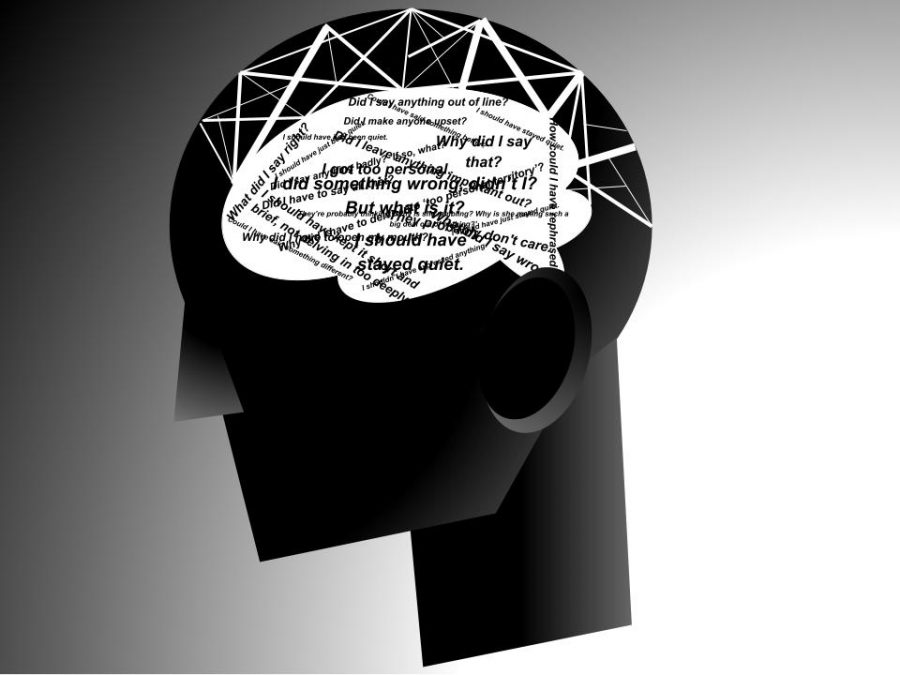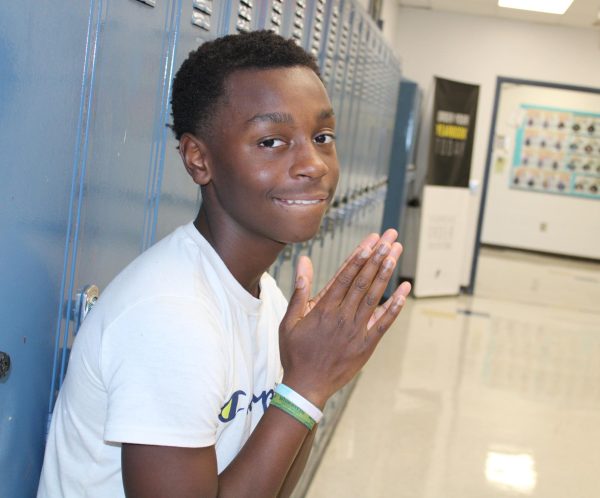A Shadow of the Mind: Social Anxiety
A visual representation of the social anxiety that lurks in my brain, ready to strike at any given time.
“Why did I say that? I should have just been quiet. Did I make anyone upset? Did I say anything out of line? Could I have said something better? Did I say anything badly? If so, what? How could I have rephrased it? I should have just stayed quiet. They probably don’t care. Why did I have to delve into ‘too personal territory’? I should have kept it short and brief. Could I have said something different? Did I leave anything important out? I did something wrong, didn’t I? But what was it? I should have just stayed quiet. I shouldn’t have expressed anything. I got too personal. What did I say wrong? What did I say right? I should have just stayed quiet.”
This is what my brain looks like after having an average conversation with somebody, even if I didn’t do anything inherently wrong. But that doesn’t stop these thoughts from flooding my brain like a massive river after its dam had been broken. The flood can last for hours or up to a few days. For some of you, this is painfully familiar. And those of you that it is, you know very well that this is what people call “social anxiety”.
As defined by the National Mental Health Institute, social anxiety is a common anxiety disorder that causes its holder to feel symptoms of anxiety or fear in certain or all situations.The person tends to be afraid of being judged, humiliated and even rejected. And as a result, people with social anxiety feel like it is beyond their control. Situations include any sort of social interaction, like meeting new people, dating, answering a question in class, or simply doing everyday things, as well as performance situations, such as public speaking, playing sport, or dancing or playing an instrument on stage. It is common for social anxiety to start in the youth, particularly in shy kids.
For instance, say you’re in girl scouts or boy scouts and the kids are off doing something and chatting in their own little groups. Guess where you are? You are sitting close to your parent who is with the other adults.
Yep, that was me. I was right by my mom’s side the majority of the time, having no desire to join the other girls. I was maybe borderline shy and a tad bit antisocial. Even as an almost adult, I still have issues being around people. It may be a bit of an understatement to say I’m not a big fan of the general populous, which unfortunately I’ve been exposed to all my life so far. Doesn’t bode well for me, does it?
I will say, I have gotten much better at interacting with people, especially my age. But that is not to say I am “problem free”. I have gotten better at public speaking (presentations), being the center of attention, interacting with perfect strangers (like at a restaurant or at the grocery store). I’m sure some of you can relate, if not at least a little bit.
Social anxiety is hard and often quite miserable. And for those that have it, you know full well that others that don’t have it don’t quite understand, no matter how hard they may try to. That’s ok.
Luckily, because it’s common (research saying about 7% of Americans have it), it can be treated. The following three treatments are recommended by the National Mental Health Organization and it is entirely up to the reader to decide what they want to do. I am only here to provide suggestions that may help us both, but not to push/force you into making any kind of decision.
First step is to talk to your doctor. Consulting your doctor will allow you to determine your social anxiety is unrelated to a physical issue (through an exam and answering questions regarding your health history) and will give you an official medical diagnosis. Your doctor may then refer you to an individual that specializes in mental health such as a psychiatrist, psychologist, clinical social worker, or a counselor. Your doctor or the specialist will also briefly discuss with you different forms of treatment, which will be discussed in the upcoming paragraphs.
The first treatment is psychotherapy, particularly CBT (cognitive behavioral therapy). CBT is often used in treating social anxiety, teaching you different ways of thinking, behaving, and reacting to situations that will help you to feel less anxious and fearful. It also will help you learn as well as practice social skills.
The second is support groups. Support groups are used in a variety of situations and treating social anxiety is no different. In a group of individuals that have social anxiety, you will find unbiased, honest feedback and support from others that truly understand what you go through. Through this, you will learn that your thoughts regarding judgement and rejection are false and/or distorted versions of reality as well as learn how others go about dealing with their own social anxiety which could help you deal with your own and overcome the fear that you may experience.
The third, of course, is medication. Like many things, medication is an option. There are three common medications that are used to treat social anxiety; anti-anxiety medications, antidepressants, and beta-blockers. All of the information below can also be found on the National Institute of Mental Health’s website.
- Anti-anxiety medications are powerful and take effect very quickly, ridding its user of their anxious feelings. However, they are not to be used long term as people can build up a tolerance to them and as a result would require a higher dose. This could lead to dependence, which is not what you want. Doctors will often prescribe these as a temporary remedy.
- Though antidepressants are mainly used to treat depression, they are also effective in treating social anxiety. Unlike anti-anxiety medications, antidepressants can take several weeks to take effect. It is important, however, to be mindful of their possible side effects: headaches, nausea, and difficulty sleeping. Despite this, the side effects are usually not severe, particularly if the dosage starts low and is increased slowly over time. Remember to talk to your doctor if you have any side effects.
- Beta-blockers are a type of medication that assist in blocking physical symptoms of social anxiety such as increased heart rate, sweating, and tremors. They are commonly used to deal with “performance” type of social anxiety.
In the end, your doctor will assist you in figuring out what medication, dosage and duration of treatment is most beneficial to you if you decide to go the medication route. According to the NIMH, people recieve the best results using a combination of medication and CBT/psychotherapies. It is important to remember that any form of treatment will take time and don’t give up on it too easily when you don’t see results instantly. It may take time. Keeping a healthy lifestyle (getting enough rest and exercising) and having a good support system with your family and friends as you undergo your journey to a life without social anxiety is essential as success as your own drive and dedication.
It will be ok, for the both of us. Social anxiety is not invincible and can be beaten. We just need the right tools and the knowhow to use them. I hope this article benefited you in some way and I wish you all the best.












